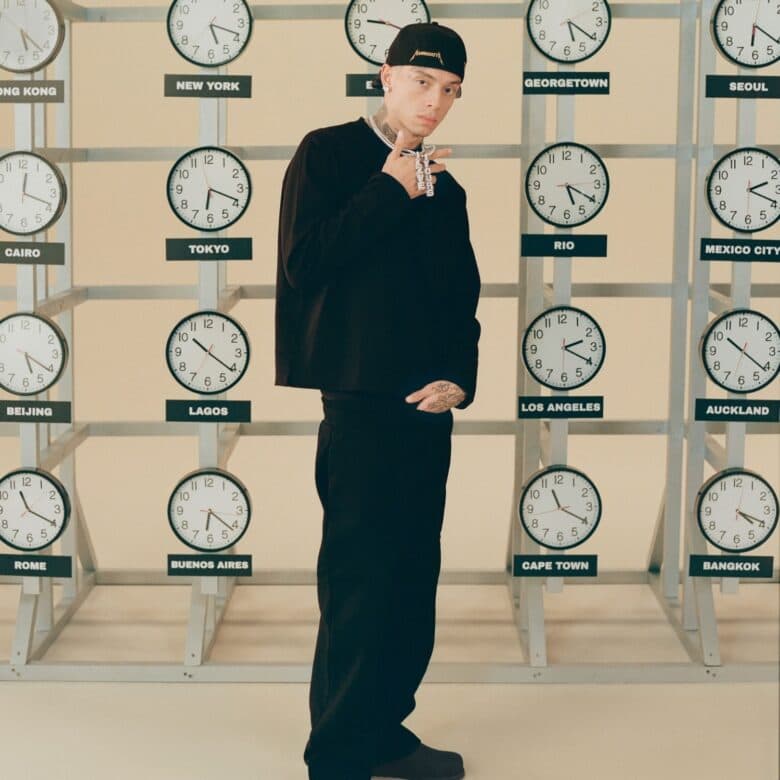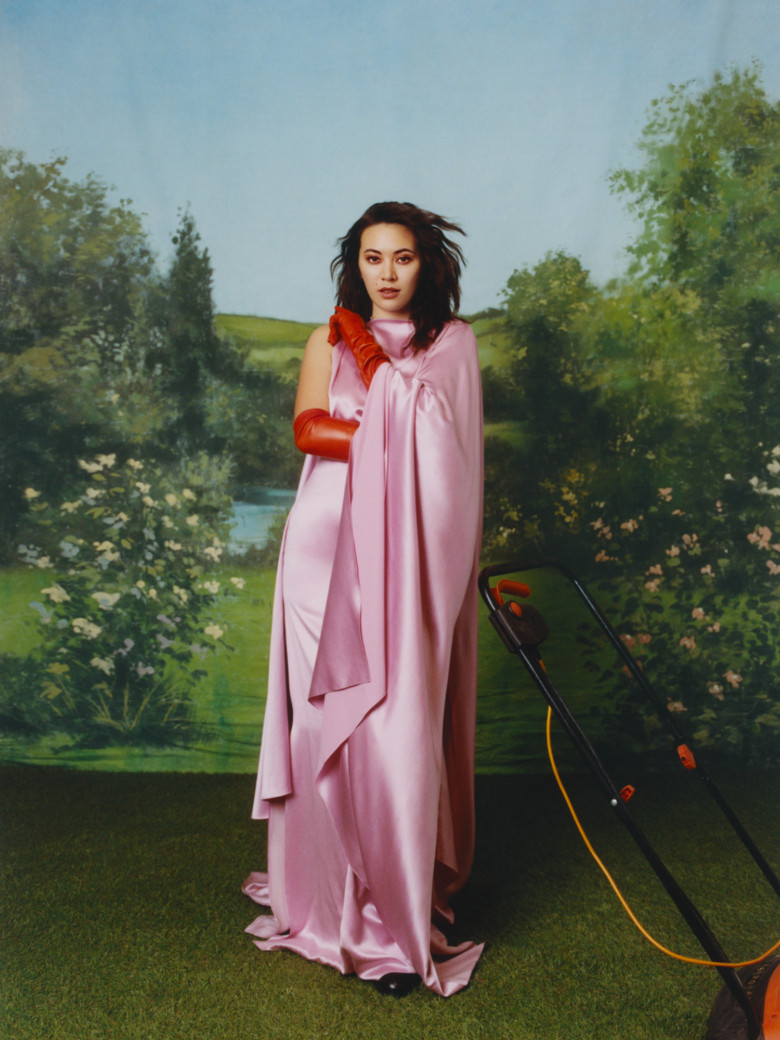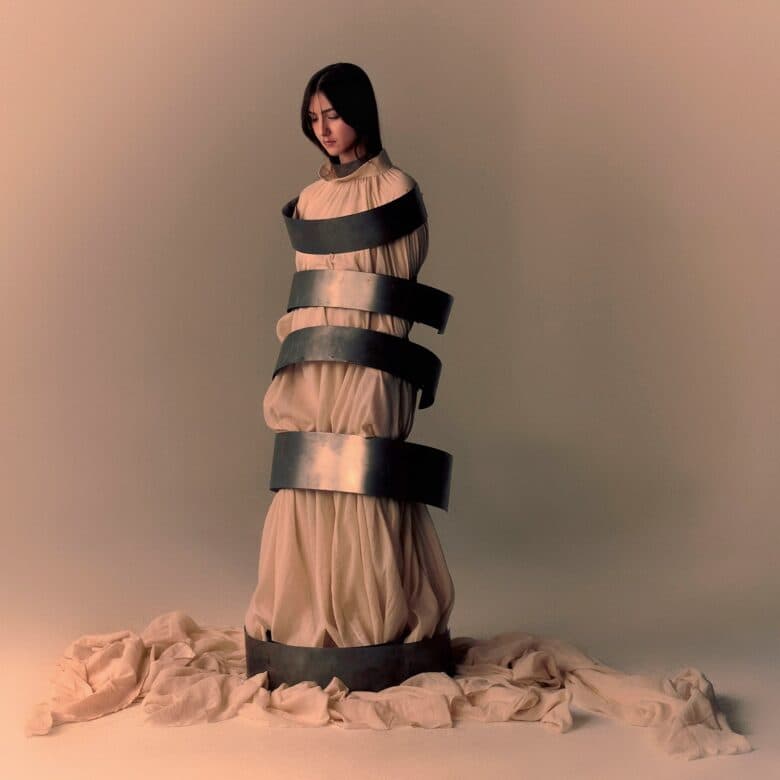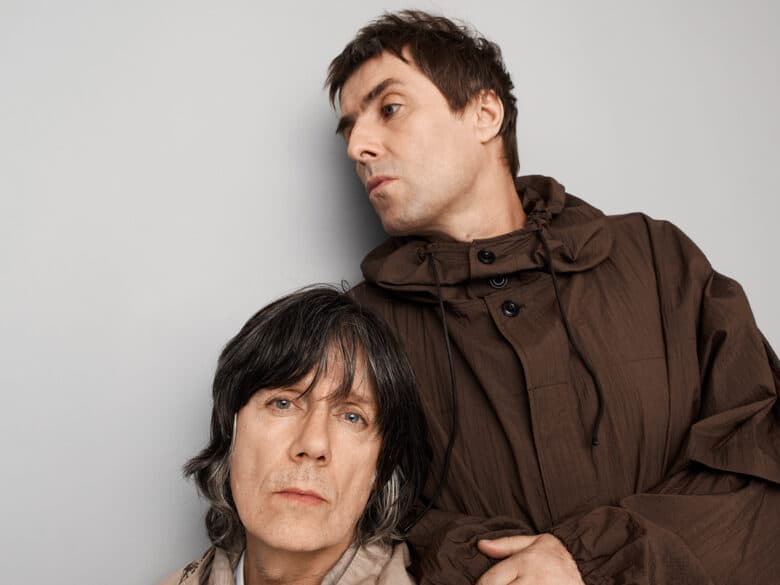The weird and wonderful worlds of Kyle MacLachlan
- PhotographerRankin
- WriterNessa Humayun
Kyle MacLachlan knows how to start things off on the right foot. The day before our interview, he personally emails me to discuss logistics. I tell him I’m looking forward to it and he replies, “Me too”, with a red heart emoji, before signing off with “Sent while being… Pursued by Bear!” – a reference to Shakespeare’s The Winter’s Tale and the name of MacLachlan’s winery. I’m speechless: this is Special Agent Cooper of Twin Peaks, Trey MacDougal from Sex and the City, Blue Velvet’s Jeffrey Beaumont, Dune’s Paul Atreides (one of them, anyway), and he just broke the fourth wall of celebrity.
One could say that MacLachlan has always acted as a guide to closed-off worlds. He is, after all, David Lynch’s guiding force, the actor who clasps the hand of the viewer and takes them into the underbelly of the American Dream. “I think there’s a curiosity of the darkness in the characters that I play,” MacLachlan says after dialling in punctually from his home in LA. “David sees me as someone who can take you on a journey from the real into the surreal. There’s certainly magic I feel on set with him. Somehow I understand what’s necessary in the course of filming.”
Perhaps it has something to do with his face. At 65, MacLachlan is still handsome – his perfectly coiffed hair is now white, but that all-American preppiness remains, as does his boyish exuberance. He has previously said that there’s something about his face that is “off”, but to me he has always looked like an ideal, and ideals are inherently safe – you could perhaps trust them to lead you to the depths of depravity and back again.
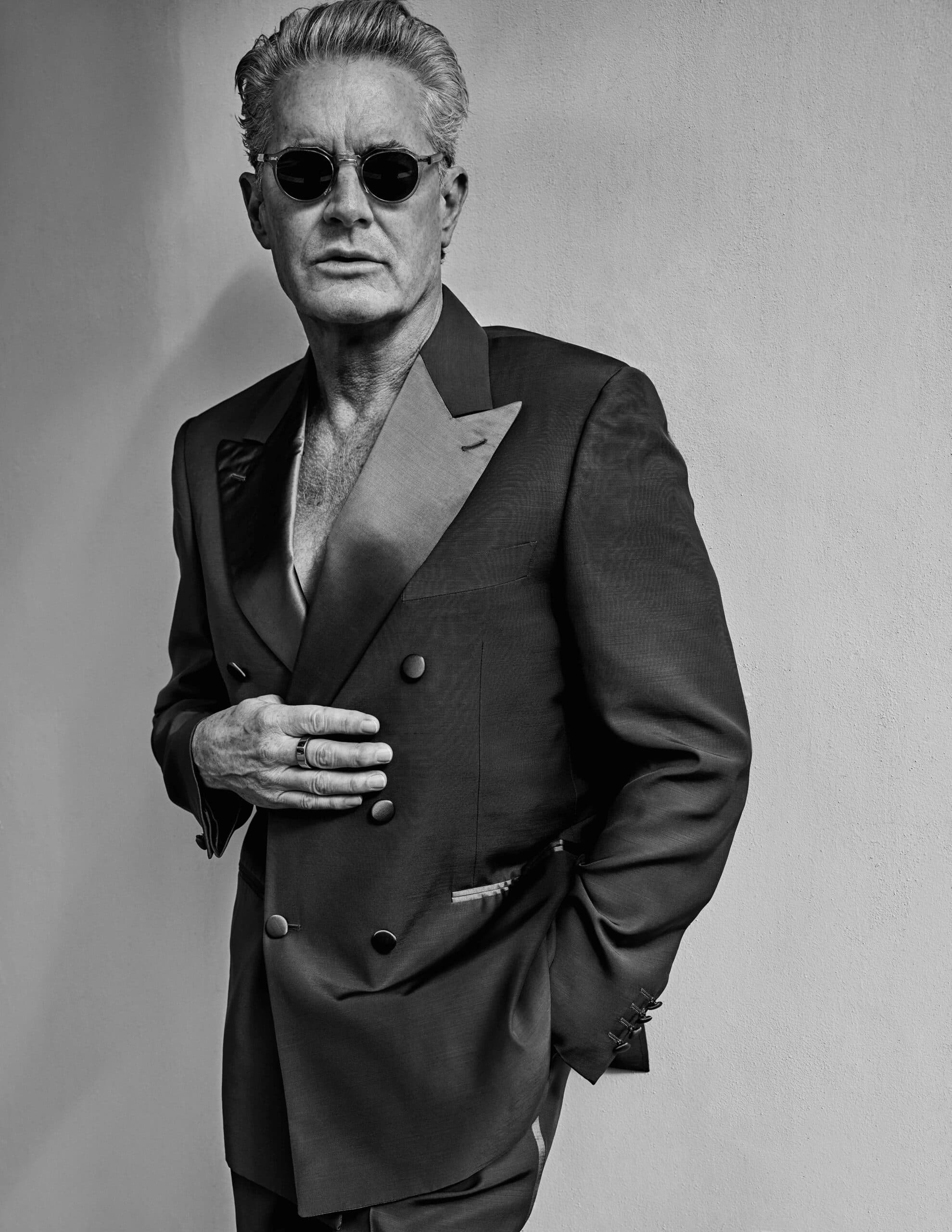
If we start somewhere near the beginning, Blue Velvet was the actor’s second movie with Lynch, who approached MacLachlan with the script during the making of 1984’s Dune. Blue Velvet is the film most associated with the director’s worldview that there is a seediness at the heart of our conceptions of safety – Dennis Hopper’s Frank, a rapist psychopath inhaling gas through a medical mask could well live in your suburban town. But more disturbingly, if someone like MacLachlan’s Jeffrey, an innocent, jumped-up boy next door, can be debased and corrupted, can’t we all? MacLachlan initially turned the part down. His mother, who was dying of ovarian cancer at the time, objected to the film’s violence, sadomasochism and treatment of women, but MacLachlan returned. The role, which remains his most “risqué” to date, now feels like it couldn’t have been played by anyone else.
Dark suburbia, for lack of a better term, is a recurring theme with MacLachlan. There’s Blue Velvet’s Lumberton, Twin Peaks, Desperate Housewives’ Wisteria Lane – even the subject of his new podcast, Varnamtown, is a tiny community in North Carolina that harbours a dark past. I put it to MacLachlan: is he drawn to it or is it something that others see in him? “I think I have a natural optimism,” he replies, “and when we think of the [ideal of suburbia], the Fifties were an upbeat and positive time in American history. I think that’s part of who I am. It’s interesting to put that into a story that has shades of the opposite, to watch optimism come up against something that’s darker or ‘evil’. A lot of David’s work is about simple games of good versus evil, and when people think of people that can project that, I guess I’m on a shortlist.”
It’s time to bring up the role that made him a household name: FBI Special Agent Dale Cooper in Twin Peaks. Lynch’s sweepingly surreal, neo noir-cum- soap opera of a television show ran for two series in 1990, centring on the beautiful homecoming queen Laura Palmer, whose murder upends a small logging town in Washington state. To say it became a phenomenon would be an understatement. I first watched the show in 2012, aged 16, and have rewatched it a half dozen times since – hell, I even went to an immersive Twin Peaks event twice because I love it so much. There’s something about it that crawls under the skin. Its iconography of sinister black and white chevrons and red drapes is indelible, as well as its sheer eclecticism: there is a dwarf that walks and talks backwards and a lady who communes with a log.
“Certainly, at the time, it was vastly different to anything [else] that was on,” MacLachlan says with a Cooper-worthy beam. “Murder mysteries are always compelling, particularly when the people involved are very young and attractive. Then there’s the whole surrealness of things. I think when you’re in your mid- teens, depending on how mature you are, you’re trying to figure the world out and understand your place in it. The world in some instances feels surreal – there are things you don’t understand and you’re in this cauldron of self-discovery. David’s imagery and storytelling doesn’t answer things – it asks a lot of questions and tells you that it’s about the search, the discovery, and that you can be who you are and that that’s OK. Where your brain and interests take you is OK, there’s no judgment – follow your heart and passion.”
Kyle MacLachlan was born during the advent of the free-wheeling Sixties, in 1959, to Catherine, a public relations director, and Kent, a stockbroker and lawyer, in Yakima, Washington. A self-confessed people pleaser from a young age, he was close to his parents until their respective deaths (the loss of his mother, who died in 1986, prior to his success, and who introduced him to acting as a teenager, is something he still struggles with). But his career was pretty much a fluke: after giving up dreams of becoming a professional golfer, he studied drama at the University of Washington, and not long after he graduated was hired by Lynch for his highly anticipated, but ultimately $45 million flop, Dune.
Most artist-muse relationships are based on something shared, and indeed there are parallels between MacLachlan and Lynch. “We grew up in a similar part of the world and have a similar sense of humour,” the actor tells me (Lynch is from America’s west too – Missoula, Montana). But there’s also something deeper: both can see beyond the white picket fences, blue skies and red roses that help compose the rose-tinted view of America, à la the opening scene of Blue Velvet. To hear it in Lynch’s words: “I discovered that if one looks a little closer at this beautiful world, there are always red ants underneath. Because I grew up in a perfect world, other things were a contrast.”
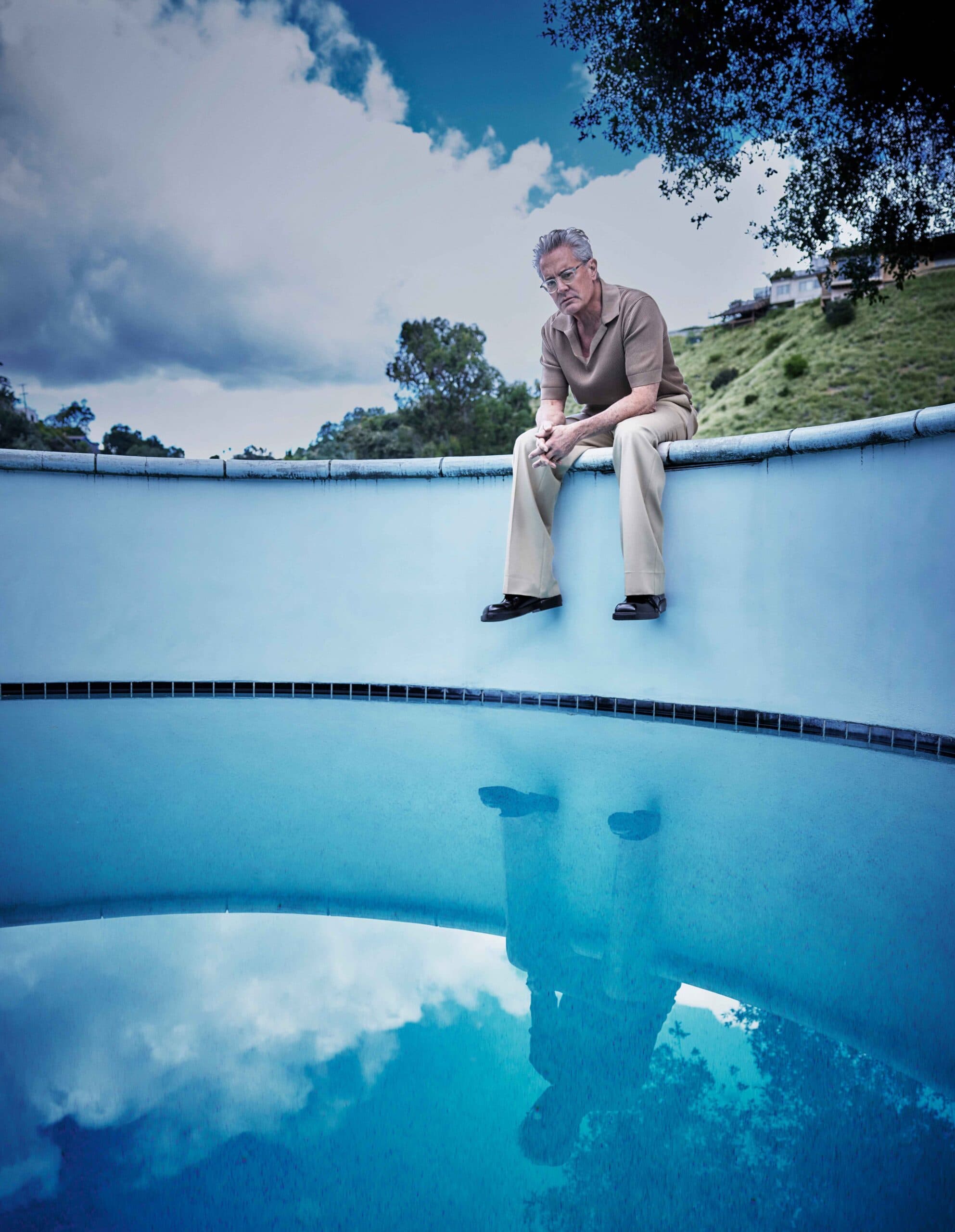
But where does one go after playing such a memorable character? MacLachlan has had his share of disappointments: Dune was eviscerated by the critics, and before Blue Velvet was reappraised, the reaction was incredibly mixed (both films garnered one-star reviews from the renowned critic Roger Ebert). Perhaps that’s why, post Twin Peaks, MacLachlan thought he would go down the leading man route. It was another failure, but to positive ends, I would argue – how else would we have got Sex and the City’s Trey or Desperate Housewives’ Orson Hodge?
“With age comes perspective,” MacLachlan mulls. “What I was hearing at that time was that if you’re pursuing a more traditional leading man there would be more opportunities and the chance of success would be greater. That was really appealing. I tried to go in that direction but there were other opportunities that seemed incredibly interesting. As I look back, I’m really happy that I made those choices – it has led to a very interesting and varied career that I would have never anticipated when I was younger. There were some crazy choices and challenging results. I have never stopped moving forward and I’m really grateful.”
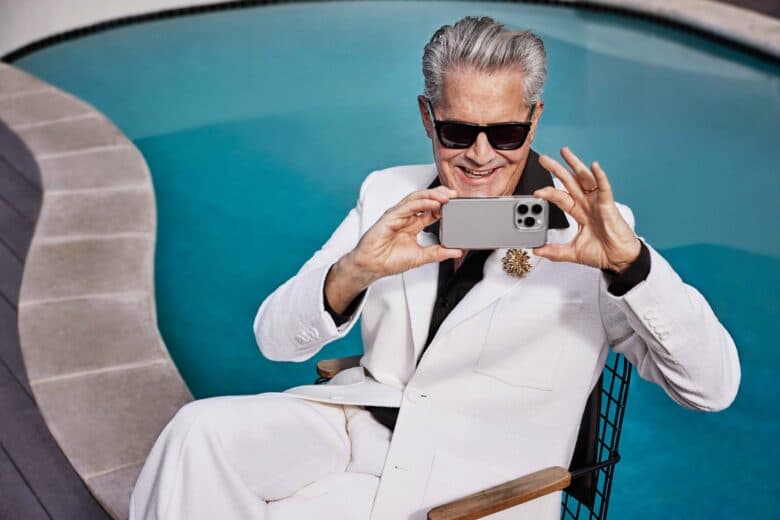
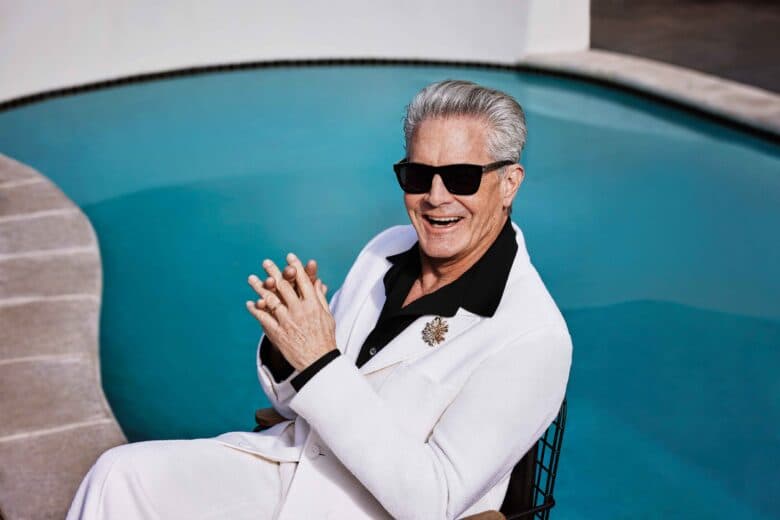
But the real disappointment for MacLachlan was Showgirls. A notorious box office bomb, featuring one of the most infamous sex scenes in film history, it is controversial, maybe even bad, but undoubtedly a camp, trashy cult classic. MacLachlan hasn’t been able to bring himself to watch it since the press screening back in 1995. Playing the bad guy was supposed to be a step in a new direction: “[Paul] Verhoeven was a director of huge respect for RoboCop and Basic Instinct, so it was going to be a very interesting working relationship. Add to that my attempt to move away from the Cooper image, which, as you can imagine, was pretty strong. I wanted to try something a little more edgy, and this was certainly edgy. There was a lot of nudity and that was a real departure, not so much for me, but a little bit for me, so the advice was, ‘Let’s go for it.’ I remember seeing the screening for the first time and being stunned at what had happened. It had been a serious attempt to make a very edgy film. It was really disappointing – heart and gut-wrenching, actually. I’m pretty clear that I’ve never been a fan of it, so it’s hard for me to comment on. I get the appeal, but when we set out, the result was not the intention. Now it’s fallen into the category of entertainment by accident… People certainly get a kick out of it.”
It’s probably the most negative thing MacLachlan has said during our chat, and even then he was politely diplomatic. The man I meet today, propped up at a wooden table at his home in LA, is the same as the person you see on his (very funny) Instagram account. He is cheerful and warm – as his face morphs into some Lynchian-type character due to poor Wi-Fi, he exclaims, “Oh no!”, makes a box around his face and goes, “I’m here!” He continually references his wife, the television producer and publicist Desiree Gruber, who he married in 2002 and shares a son with. He’s the same on set: after his HUNGER shoot, a member of the crew emailed me to say, “Kyle was the sweetest, kindest and most easy-going celebrity we’ve ever worked with.”
It must have felt very out of character, then, to return to Twin Peaks for the third series not as Agent Cooper, but two Cooper doppelgangers: the innocuous insurance salesman Dougie Jones and Mr C, a being from the Black Lodge so evil that MacLachlan looked to Javier Bardem’s character in No Country for Old Men for inspiration. Essentially, if you already thought Lynch was “weird”, then 2017’s Twin Peaks: The Return is off the charts; don’t expect answers to anything. “It was a challenge to step into the skin of Mr C and exist in that space,” MacLachlan tells me. “Once I was there, there was a sense of power that was alluring and enticing – it wasn’t me or my comfort zone but I recognised the power of it. There was a coldness and a cruelty there which was challenging [Mr C murders his own son]. It took its toll, but I was very happy that at the end of each day I could take the leather jacket off and walk away from his energy. It was a walk in the dark world.”
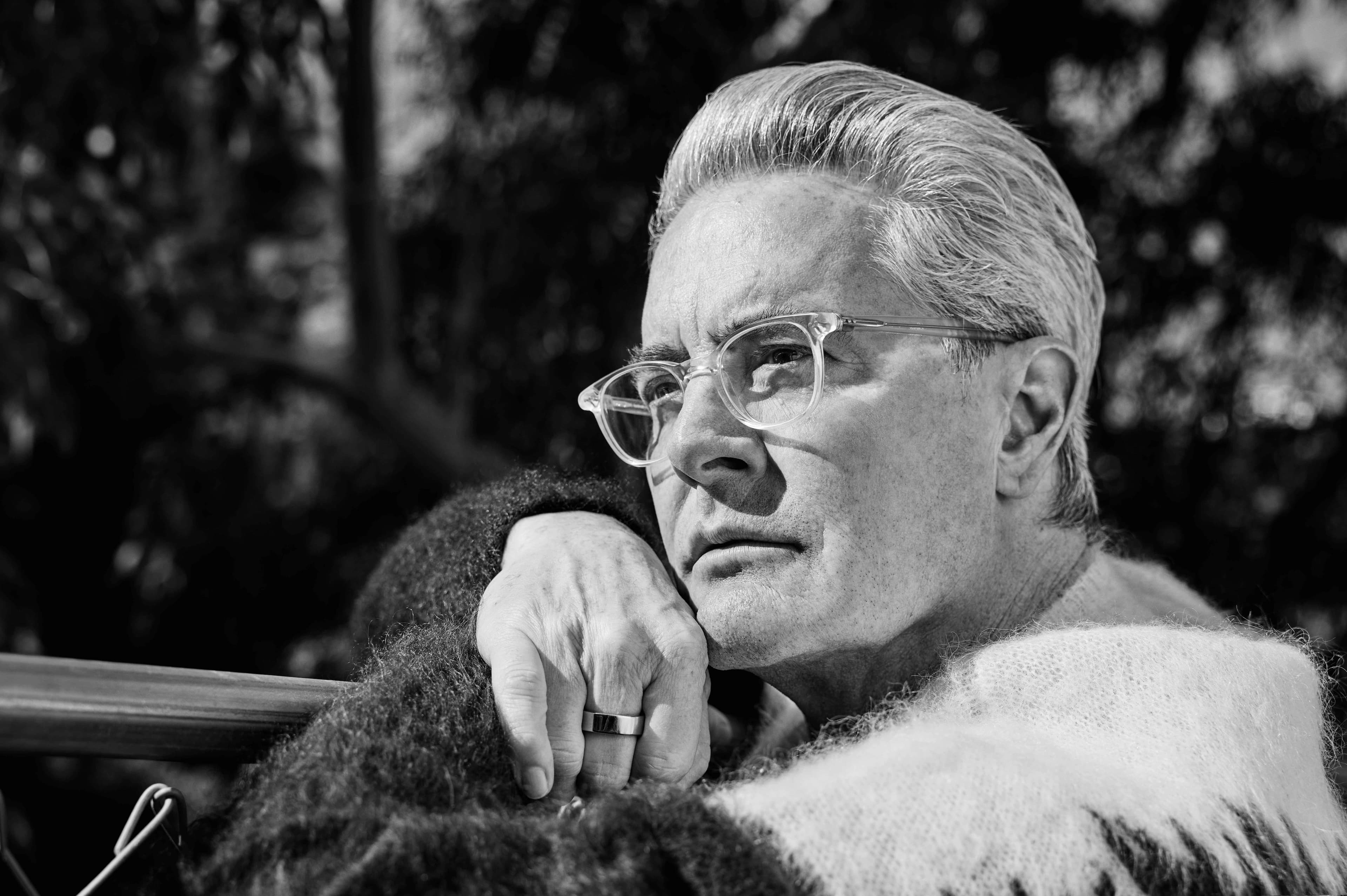
Few actors have the chance to re-experience the greatest role of their career – as MacLachlan exclaims: “We had a chance to do it again! I mean, that just doesn’t happen.” But it was also emblematic of MacLachlan’s evolution as an actor: returning to the series that made him more than 25 years later, he was able to do what hadn’t been possible previously. “David recognised that creating Mr C was going to be a challenge for me. It made me feel really good that he had the confidence in me that I could pull it off. I did it with his help and made a very memorable and scary character.” The fact it worked is also testament to his and Lynch’s enduring creative partnership. “We’ve been friends since we started,” MacLachlan says. “We both went off and did our own things and I think I represent a certain thing to David – I live in his world as those characters. But I still hold out hope that we might be able to work on something together again. There’s nothing in the works, but it would be such a pleasure if it were to happen. We don’t live far from each other in LA and I’m planning to see him again sometime in the next couple of weeks.”
MacLachlan has made a career out of following his curiosity; it may not have led to the one he imagined, but he’s a glass-half-full kind of guy. He tells me about the subject of his new podcast Varnamtown – a tiny Southern US town that got itself embroiled with none other than Pablo Escobar. Two years ago, MacLachlan heard the story from a friend and enlisted the help of the investigative journalist Joshua Davis to get to the bottom of what happens when a tap of money and cocaine is turned on in a tight-knit community. MacLachlan is clearly getting a lot of joy out of it, just as he seems to be from playing his latest character, Overseer Hank in the new Amazon Prime series based on the popular game Fallout. And when he’s not acting, he’s nurturing his love of wine via his Pursued by Bear winery in Walla Walla, Washington. MacLachlan loves wine – he started drinking it in high school, “before you’re supposed to” – but it’s especially the wines produced in Washington state that he waxes lyrical about. It’s in the simple enjoyment of things, he tells me.
Has he always been like this – so… happy? “I think that’s my default. I wake up in the morning and I feel pretty good about the day. The older I get, the more grateful I am,” he smiles. Our conversation has overrun by 40 minutes, so I’m keen to let him go. He blows me a kiss, thanks me for the “lovely questions” and the “very sweet research”, and wishes me luck on my wine journey. I leave cheerier than I went in. We should all be more like Kyle MacLachlan, I think for days to come.
- PhotographerRankin
- StylistSandra Solé
- WriterNessa Humayun
- GroomerLivio Angileri
- Styling AssistantFlutur Gërbeshi
- ProducerSarah Stanbury
- LocationNSA Studio
- RetouchingTrue Black Studio
